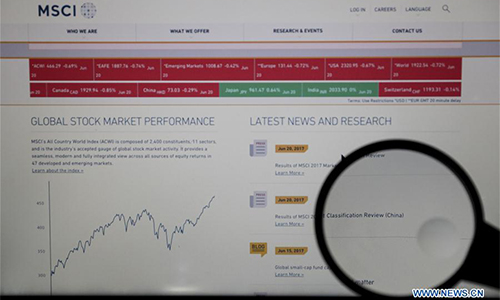MSCI unveils climate change indexes for China market
Source: Global Times Published: 2020/8/18 16:48:04

Photo taken on June 20, 2017 shows the website of global equity indexes provider MSCI on a computer in New York, theUnited States. Global equity indexes provider MSCI announced that beginning in June 2018, it will include China A-shares in the MSCI Emerging Markets (EM) Index and the MSCI ACWI Index. (Xinhua/Wang Ying)
Global stock markets index provider MSCI on Tuesday unveiled two climate change indexes for China to gauge the country's transition to a low-carbon economy.
The indexes are intended to improve listed companies' environmental, social and governance (ESG) stewardship, boding well for globalizing A shares, according to an MSCI executive.
MSCI took the wraps off the new thematic indexes at an online media briefing. Alibaba, Tencent and Meituan Dianping are among the top 10 constituents of the MSCI China Climate Change Index, while Kweichou Moutai, Ping An Insurance and China Merchants Bank make the list of the 10 most-weighted components of the MSCI China A Climate Change Index.
The two indexes remain consistent with their parent indexes - the MSCI China Index and the MSCI China A Index - in terms of the number of constituents. The difference is that the climate change indexes are a reweighting of their parent indexes based on companies' low carbon transition scores and their categorization, Xu Shuo, vice president of MSCI Research, said in response to a question raised by the Global Times.
China has been pushing to cut carbon emissions over the past five years, delivering on its promises made when it signed the Paris Climate Agreement in 2016, an indication of the country's transition toward a low-carbon economy, said Wang Xiaoshu, head of the Asia-Pacific team excluding Japan and Australia at MSCI ESG Research.
The MSCI China Climate Change Index represents a 65 percent reduction as measured by carbon emission intensity relative to the MSCI China Index and a 90 percent reduction in thermal coal reserve exposure, according to the index provider.
Passive investment portfolios tracking MSCI indexes tend to be channeled into the economy's shift toward green growth, while those keen on a low-carbon transition could build their investment strategies based on the new indexes, Xu reckoned.
China's regulatory framework overseeing listed companies has largely revolved around business operations, while the climate change indexes are weighted toward medium- to long-term investing prospects, better fitting A shares into global regulatory calls for listed firms to improve climate-related disclosure, market watchers said.
In the words of Xu, this augurs well for the internationalization of A shares, and will attract more investors into China's domestic market.
The benchmark Shanghai Composite Index ended up 0.36 percent on Tuesday, bringing its year-to-date gain to 13.15 percent, while the tech-heavy ChiNext index soared 50.22 percent for the year.
Global Times
Posted in: MARKETS